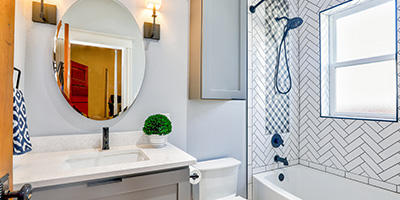Key Bathroom Plumbing Advice Every New Homeowner Should Know
Key Bathroom Plumbing Advice Every New Homeowner Should Know
Blog Article
This great article underneath in relation to 11 Must-Read Tips for Plumbing a New House is truly enlightening. Don't overlook it.

For brand-new home owners, understanding and keeping washroom plumbing can save both money and time by preventing pricey problems down the line. Right here are some necessary restroom plumbing ideas to aid you maintain every little thing running efficiently.
Get Ready For Cold Weather
Safeguard your pipelines from freezing during winter by protecting pipes in unheated locations like basements, attic rooms, and garages. During severe cool, let cold water drip from taps served by revealed pipes to aid protect against freezing.
Set Up Regular Upkeep
Take into consideration organizing annual inspections with a licensed plumbing. They can spot issues that you could miss out on, such as covert leakages or damage on pipelines and components. Routine upkeep aids extend the life of your pipes system and can protect against emergency situations.
Acquaint Yourself with the Main Shut-Off Shutoff
Knowing where the major water shut-off valve lies in your house is important. This enables you to swiftly shut off the water supply in case of significant leakages or during plumbing emergencies, preventing substantial water damage.
Consistently Check for Leaks
Small leakages can cause big troubles. On a regular basis check under sinks, around commodes, and near pipes fixtures for any indications of leakages. Search for wetness, small drips, or corrosion. Catching and repairing leaks early can avoid extra severe damage and save water.
Preserve Your Hot Water Heater
Ensure your hot water heater is readied to an appropriate temperature (normally about 120 degrees Fahrenheit) to stop hot and reduce power usage. Flush the storage tank yearly to eliminate sediment build-up, which can lower the effectiveness and life expectancy of your heating system.
Update Your Components
If your home has older components, think about upgrading to extra reliable models. Modern toilets, showerheads, and faucets are created to utilize much less water while providing excellent stress, which can considerably lower your water bill and ecological impact.
Be Cautious with Do It Yourself Pipes Repair Works
While it's appealing to manage all home fixings by yourself, beware with plumbing. Some problems might call for specialist knowledge, particularly if they involve major water lines or drain repairs. Employing a specialist can in some cases be a lot more economical than DIY, particularly if it protects against further damage.
Don't Disregard Slow Drains
If your sink or tub is draining gradually, it's usually an indication of a clog developing. Addressing this early can prevent a complete clog. Make use of a bettor or a plumbing professional's serpent to clean out particles. Avoid making use of chemical drain cleansers as they can damage your pipelines in time.
Know What Not to Flush
Commodes are not waste disposal unit. Avoid purging anything apart from toilet paper and human waste. Things like wipes, womanly hygiene items, and cotton swabs should be taken care of in the trash to prevent obstructions and sewer back-ups.
Set Up Strainers in Drains
Place filters in your sink and bathtub drains pipes to capture hair and other particles before they enter your pipes system. Cleaning the filters on a regular basis will help stop buildup and maintain water streaming openly.
Conclusion
Comprehending and keeping your home's restroom pipes can avoid several usual issues. By adhering to these vital pointers, you can ensure your bathroom stays functional and efficient, saving you time and money in the long run.
Essential Plumbing Tips for Homeowners: Keep Your Pipes Flowing Smoothly
As a homeowner, understanding the basics of your plumbing system can save you time, money, and a lot of headaches. Plumbing issues can range from minor annoyances like dripping faucets to major problems like burst pipes that cause significant damage. This guide provides essential tips to help you maintain your plumbing system and tackle common issues.
Understanding Your Plumbing System
Supply System: Brings fresh water into your home from a municipal source or a well. Drain-Waste-Vent System: Removes wastewater and vents sewer gases outside. Fixtures and Appliances: Includes sinks, toilets, showers, dishwashers, and washing machines. Basic Maintenance Tips
Regular Inspections: Periodically check for leaks, corrosion, and other signs of wear and tear. Look under sinks, around toilets, and near water heaters. Know Your Main Shut-Off Valve: In case of a major leak, you’ll need to shut off the water quickly. Ensure everyone in your household knows where the main shut-off valve is located. Prevent Frozen Pipes: In cold climates, insulate exposed pipes and let faucets drip during extreme cold to prevent freezing. Use Strainers: Install strainers in sinks and tubs to catch hair, food particles, and other debris that can cause clogs. Common Plumbing Issues and Solutions
Clogged Drains:
Prevention: Avoid pouring grease down the drain and use drain screens to catch debris. DIY Fix: Use a plunger or a plumbing snake to clear minor clogs. For stubborn clogs, a mixture of baking soda and vinegar can sometimes help. Leaky Faucets:
Prevention: Replace washers and seals regularly. DIY Fix: Turn off the water supply, disassemble the faucet, and replace worn parts.

Find Out More Report this page